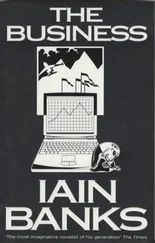Linter stopped. He was looking through an iron grille at a shop selling religious statues, holy water containers, Bibles and commentaries, crosses and rosaries and crib and manger scenes. He stared down at it all, and I watched him. He nodded at the window display. 'That’s what we’ve lost, you know. What you’ve lost; all of you. A sense of wonder and awe and… sin. These people know there are still things they don’t know, things that can still go wrong, things they can still do wrong. They still have the hope because the possibility is there. Without the possibility of failure, you can’t have hope. They have hope. The Culture has statistics. We — it; the Culture — is too certain, too organized and stifled. We’ve choked the life out of life; nothing’s left to chance. Take the chance of things going wrong out of life and it stops being life, don’t you see?' His pinched, dark-browed face looked frustrated.
'No, I don’t see,' I told him.
He ran one hand through his hair, shook his head. 'Look; let’s eat, huh? I’m really hungry.'
'Okay; lead on. Where?'
'This way; somewhere really special.' We started off in the same direction again, came to the corner of 48th Street and turned up that. A cold wind blew around us, scattering papers. 'What I mean is, you have to have that potential for wrongness there or you can’t live… or you can but it doesn’t mean anything. You can’t have the peak without the trough, or light without shade… it’s not that you must have evil to have good, but you must have the possibility for evil. That’s what the Church teaches, you know. That’s the choice that Man has; he can choose to be good or evil; God doesn’t force him to be evil any more than He forces him to be good. The choice is left to Man now as it was to Adam. Only in God is there any real chance of understanding and appreciating Free Will.'
He pushed my elbow, steering me down an alley. A white and red sign glowed at the far end. I could smell food.
'You have to see that. The Culture gives us so much, but in fact it’s only taking things away from us, lobotomizing everybody in it, taking away their choices, their potential for being really good or even slightly bad. But God, who is in all of us; yes, in you too, Diziet… perhaps even in the ship for all I know… God, who sees and knows all, who is all-powerful, all-knowing, in a way that no ship, no mere Mind can ever be; infinitely knowing, still allows us; poor, pathetic, fallible humanity — and by extension, pan-humanity… allows even us; the, the—'
It was dark in the alley, but I should still have seen them. I wasn’t even listening properly to Linter, I was just letting him witter on, not concentrating. So I should have seen them, but I didn’t, not until it was too late.
They moved out from behind us, knocking over a dustcan, shouting, crashing into us. Linter spun around, letting go of my elbow, I turned quickly. Linter held up one hand and said — did not shout — something I didn’t catch. A figure rushed at me, half crouched. Somehow, without seeing it, I knew there was a knife.
It all remains so clear, so measured. I suppose some secretion had taken over the instant my midbrain realized what was happening. It seemed very light in the alley, and everybody else was moving slowly, along lines like laser beams or cross-hairs, casting weighted shadows in front of them along those lines in the direction they were moving.
I stepped to one side, letting the boy and the knife spin past. A right-foot trip and a little pressure on his wrist as he went by and he had to let the knife go. He stumbled and fell. I had the knife, and threw it far away down the alley before turning back to Linter.
Two of them had him on the ground, kicking and struggling. I heard him cry out once as I moved towards them, but I recall no other sound. Whether it was really as silent as I remember it, or whether I was simply concentrating on the sense that yielded the most information, I don’t know. I caught the heels of one of them, and pulled, heaving him out and up, cracking his face against one boot where I’d stuck it out to meet him. I threw him out of the way. The other one was already up. Lines seemed to be bunching up at the side of my vision, and throbbing, making me think about how much time the first one had had to regain his balance if not his knife. I realized I wasn’t doing this the way you were meant to. The one in front of me lunged. I stepped out of the way, turning again. I hit him on the head while I looked back at the first one, who was on his feet, coming forward, but hesitating at the side of the one I’d hit second, who was struggling up against the wall, holding his face; dark blood on pale skin.
They ran, as one, like a school of fish turning.
Linter was staggering, trying to stand. I caught him and he clutched at me, gripping my arm tightly, breath wheezing. He stumbled and sagged as we got to the red and white light outside the little restaurant. A man with a napkin stuffed in the top of his vest opened the door and looked out at us.
Linter fell at the doorstep. It was only then I thought of the terminal, and realized that Linter was gripping the top of my coat, where the terminal brooch was. The smells of cooking came out of the open door. The man with the napkin looked cautiously up and down the alley. I tried to prise Linter’s fingers free.
'No,' he said. 'No.'
'Dervley, let go. Let me get the ship.'
'No.' He shook his head. There was sweat on his brow, blood on his lips. A huge dark stain was spreading over the fawn coat. 'Let me.'
'What?'
'Lady?'
'No. Don’t.'
'Lady? Want me to call the cops?'
'Linter? Linter?'
'Lady?'
' Linter !'
When his eyes closed his grip loosened.
There were more people at the restaurant door. Somebody said, 'Jesus.' I stayed there, kneeling on the cold ground with Linter’s face close to mine, thinking: How many films? (The guns quieten, the battle stops.) How often do they do this, in their commercial dreams? (Look after Karen for me… that’s an order, mister… you know I always loved you… Killing of Georgie… Ici resté un deporté inconnu…) What am I doing here? Come on lady.
'Come on lady. Come on, lady… ' Somebody tried to lift me.
Then he was lying beside Linter looking hurt and surprised and somebody was screaming and people were backing off.
I started running. I jabbed the terminal brooch and shouted.
I stopped at the far end of the alley, near the street, and rested against a wall, looking at the dark bricks opposite.
A noise like a pop, and a drone sinking slowly down in front of me; a business-like black-body drone, the inky lengths of two knife missiles hovering on either side above eye level, twitchy for action.
I took a deep breath. 'There’s been a slight accident,' I said calmly.
6.3: Halation Effect
I looked at Earth. It was shown, in-holo'd, on one wall of my cabin; brilliant and blue, solid and white-whorled.
'Then it was more like suicide,' Tagm said, stretching out on my bed. 'I didn’t think Catholics—'
'But I cooperated,' I said, still pacing up and down. 'I let him do it. I could have called the ship. After he lost consciousness there was time; we could still have saved him.'
'But he’d been altered back, Dizzy, and they’re dead when their heart stops, aren’t they?'
'No; there’s two or three minutes after the heart stops. It was enough time. I had enough time.'
'Well then so did the ship. It must have been watching; it was bound to have had a missile on the case.' Tagm snorted. 'Linter was probably the most over-observed man on the planet. The ship must have known too; it could have done something. The ship had the control, it had the real-time grasp; it isn’t your responsibility, Dizzy.'
Читать дальше












